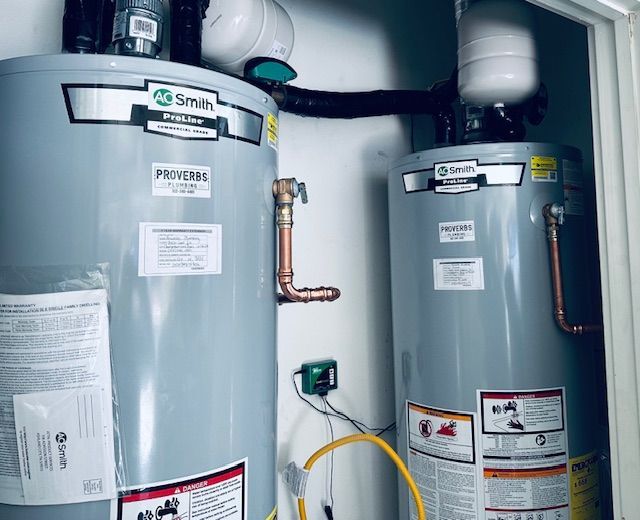When you wake up in the morning ready for a soothing, hot shower and instead find ice-cold water spewing from the faucet, it can throw off your entire day. Suddenly, you’re left wondering, “Can a water heater be repaired, or do I have to replace it?” Here at Proverbs Plumbing, we understand how important it is for families to have a reliable source of hot water—whether it’s for showers, washing dishes, or simply keeping up with laundry. Over the years, we’ve seen the full spectrum of water heater troubles, from small hiccups to full-blown catastrophes. In this blog, we’ll share everything we know about determining whether a repair is enough or if a brand-new unit is a better solution for your home.
The Importance of a Functional Water Heater
Before diving into the age-old question, “Can a water heater be repaired?” let’s step back and appreciate the role this appliance plays in our daily lives. Aside from the obvious comfort of having hot water on demand, a well-functioning water heater also:
- Improves Home Hygiene: Hot water is essential for effectively washing dishes and killing bacteria in your laundry.
- Boosts Household Efficiency: A water heater that consistently provides hot water helps everyone stay on schedule—no more waiting around for the shower to heat up.
- Maintains Value: A properly maintained water heater can extend the life of your home’s plumbing system and keep overall property value intact.
When your water heater fails, it’s more than just an inconvenience—it can disrupt your entire household. That’s why it's key to make a quick and informed decision.
Signs Your Water Heater Might Need Repair or Replacement
Although every situation is unique, some universal warning signs indicate your water heater is struggling. Here are a few red flags to watch out for:
- Inconsistent Water Temperature: If you notice extreme fluctuations—scalding hot one minute, ice-cold the next—it can signal a failing thermostat, a damaged heating element, or sediment buildup.
- Reduced Hot Water Supply: Perhaps the water never truly heats up to your preferred temperature or runs out much faster than before. This could be due to a failing heating element or a partially clogged dip tube inside the tank.
- Discolored or Rusty Water: Rusty or brownish water can indicate internal corrosion, which can cause trouble for an aging water heater. It might also mean that your anode rod—a small component that helps prevent tank corrosion—has worn away.
- Strange Noises: Banging, popping, or rumbling noises often mean sediment has built up at the bottom of the tank. In some instances, flushing out the tank fixes the issue. In others, more serious internal damage could be developing.
- Leaking or Pooling Water: Puddles around the base of the unit can point to cracked or corroded components. Sometimes, it’s just a faulty valve, but if the tank itself has rusted through, repair may no longer be an option.
Each of these issues can have multiple underlying causes, some of which are minor enough to fix quickly, while others require a larger overhaul or total replacement. The trick is deciding which path to choose.
When a Repair Makes Sense
So, can a water heater be repaired if the damage isn’t catastrophic? Absolutely—particularly if the trouble stems from small, easily replaced components or minor internal issues. Here are a few specific instances when a repair might be your best bet:
- The Unit Is Fairly New: Water heaters typically last anywhere from 8 to 12 years. If yours is only 5 years old (or younger) and you’ve kept up with basic maintenance, a faulty thermostat or broken heating element is usually worth fixing. Replacement parts for these types of repairs are relatively inexpensive, and labor costs tend to stay manageable.
- Minor Leaks or Valve Issues: Sometimes, the problem is confined to a single component—like a pressure relief valve or a drain valve that isn’t sealing properly. In that case, a plumber can swap out the defective part, tighten connections, and send you on your way with a functional water heater.
- Electrical or Pilot Light Malfunctions: Electric water heaters rely on heating elements and thermostats, while gas water heaters depend on pilot lights and gas regulators. If your water heater refuses to light or maintain a steady temperature, it could be as simple as fixing a faulty sensor or re-lighting the pilot. These tasks typically fall on the easier side of repairs and can extend the life of your water heater by several years.
- Minimal Rust in Targeted Areas: Rust inside a tank usually spells trouble, but if the corrosion is located on easily replaceable parts—like the anode rod—tackling it early can prevent the tank walls from deteriorating. Replacing this rod as needed is one of the best ways to ward off future rust problems.
When Replacement Is the Smarter Option
There are times, however, when our team at Proverbs Plumbing advises our clients to skip the short-term fixes and invest in a brand-new water heater. While the upfront cost can be intimidating, a replacement often saves you both money and frustration in the long run. Here’s how to know when it’s time:
- The Water Heater Is Approaching Retirement Age: As mentioned, most water heaters last about a decade—sometimes a bit longer if well maintained. However, once you approach that 8- to 12-year range, even minor issues can be symptoms of bigger, underlying damage. Regular repairs might buy you a little time, but they also add up quickly. If your water heater is on its last legs, replacing it can spare you the hassle of repeated breakdowns.
- You Spot Significant Corrosion: Small bits of rust might be manageable, but large-scale corrosion on the tank itself is a red flag that usually calls for a replacement. Corrosion weakens the tank, creating a higher risk of cracks and leaks, which can lead to potentially expensive water damage in your home.
- You’ve Poured Money into Multiple Repairs: If you’ve already replaced the heating elements, flushed out the tank, installed a new valve, and are still battling new problems every few months, it may be time to say goodbye. Continual repairs aren’t just inconvenient; they can easily surpass the cost of a new unit over time. Spending a little more now could spare you from frequent stress and escalating bills.
- You’re Looking for Better Efficiency: Older models tend to guzzle energy, leading to higher utility bills each month. Upgrading to a modern, energy-efficient water heater—especially a tankless system—can reduce your monthly costs. Over time, the savings can offset the price of the new unit, making it a long-term win for both your wallet and the environment.
Cost Comparisons: Repair v3s. Replacement
Let’s get down to brass tacks. What do these repairs and replacements actually cost? While the exact figures vary depending on your location and the specific problem, here’s a ballpark overview:
- Minor Repairs ($150–$300): Replacing a thermostat, heating element, pressure relief valve, or fixing a small leak typically falls into this range.
- More Extensive Repairs ($300–$600+): If you’re dealing with multiple failing parts or more involved diagnostics, costs can climb accordingly.
- Full Replacement ($1,000–$2,000+): A standard tank water heater plus installation can land in this bracket. The exact price depends on the size of the tank, the brand, and any required modifications to your existing plumbing or electrical/gas connections. Tankless water heaters can cost more upfront, but they offer substantial energy savings and often last longer.
When deciding whether to repair or replace, consider the difference between the two estimates. If a repair is only a couple hundred dollars, and your water heater is fairly new, that might be your best move. But if you’re looking at a $600 repair bill on a decade-old water heater, a new system could be the wiser investment.
Proactive Maintenance to Extend Your Water Heater’s Life
While we can’t guarantee immortality for any appliance, there are steps you can take to get the most out of your water heater:
- Flush the Tank Annually: Sediment builds up at the bottom of the tank over time, reducing efficiency and putting more strain on the heating elements. Flushing the tank once a year can significantly improve both performance and lifespan.
- Check (and Replace) the Anode Rod: The anode rod attracts corrosive minerals and helps protect the tank walls from rust. Inspecting it every year or two and replacing it when it’s heavily corroded can keep the tank itself in good shape.
- Adjust the Temperature: Many water heaters are preset at around 140°F, but you can lower that to 120°F or 130°F for most household needs. This will save energy and reduce wear and tear on the heating elements.
- Monitor for Leaks: Perform occasional spot checks to see if any water is pooling around the base of your water heater. Catching a small leak early can prevent bigger issues down the road.
Making the Right Call: Repair or Replace?
If you’re wondering, “Can a water heater be repaired?” start by weighing its age, the extent of damage, and potential repair costs against the advantages of a new, energy-efficient unit. A quick fix might suffice for newer tanks with minor issues, but older models with hefty repair bills often make replacement a smarter long-term choice.
At Proverbs Plumbing, we believe in honest assessments that save you from cold showers and skyrocketing utility costs. Whether you opt for a simple repair or a brand-new system, our goal is to help you make a well-informed decision that suits your home and budget. If you have questions or need an expert opinion, reach out to schedule an inspection. We’ll guide you every step of the way—so you can enjoy reliable hot water without the guesswork.
Call us at (512) 240-4401 and let us know how we can assist you.
Company Information
Proverbs Plumbing
Georgetown, TX 78628
Mon - Fri: 7AM - 5PM
Sat & Sun: Closed
Proverbs Plumbing © All Rights Reserved - 2024. Sitemap | Privacy Policy

